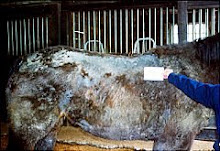***************************************************
Will Insurance Cover these "accidental" deaths?
Hummmmm.....
A ProMED-mail post
ProMED-mail is a program of the
International Society for Infectious Diseases
Date: Wed 22 Apr 2009
Source: The Miami Herald, Palm Beach Post report [edited]
Polo captain: tainted vitamin killed 21 ponies
----------------------------------------------
The 21 polo ponies that died in Wellington Sunday [19 Apr 2009] were all
injected before the game with a vitamin supplement called Biodyl, and team
members believe a tainted dose caused their deaths, the team's captain
said. Juan Martin Nero, captain of the Lechuza Caracas polo team, told the
La Nacion newspaper in Buenos Aires that all of the horses had received
Biodyl injections before the game. "We don't have any doubts about the
origin of the problem," Nero said. "There were 5 horses that weren't given
the vitamin and they are the only ones that are fine."
Biodyl is a French-made supplement that contains vitamin B, selenium, and
chromium, La Nacion reported. Nero said that Biodyl "is what the horses are
always given. For us, the suspicions are that there was something bad in
the laboratory," Nero said. "They're common vitamins that aren't given to
improve performance but rather to help them recover from exhaustion."
Dr Scott Swerdlin, a veterinarian at the Palm Beach Equine Club who helped
treat the animals as they were dying, told the Post that Biodyl is not
approved for use or sale in the United States. But a licensed veterinarian
could obtain Biodyl by submitting a prescription to a pharmacy containing
the recipe for the supplement, he said.
If Biodyl shows up on the tests, now being done in Kissimmee and
Gainesville, an independent lab should determine if the Biodyl mix was
correct, said Swerdlin. "Biodyl is routinely used in Europe as a vitamin
supplement," Swerdlin said. "My practice does not use it."
"It's dangerous," Kentucky-based veterinarian Fernando Garcia told La
Nacion. "Ordering it from France isn't an easy task because you have to
specify what its use will be and in what animal. In the case of the polo
ponies' deaths, I don't think it was Biodyl but it could have been an
imitation."
Well-known Wellington polo patron Neil Hirsch, who co-owns the
Bridgehampton Polo Club on Long Island, said vitamins are commonly used but
rarely administered on a game day. "Everybody gives their polo horses
vitamins," Hirsch said. "But they're given on a Monday or Tuesday when no
one's playing. You just don't give them the day of a match."
Dr Christie Ward, a veterinarian at the University of Minnesota, said that
supplements are generally unlikely to harm horses but that some contain
substances that could prove harmful in large quantities. Selenium, a
substance found in Biodyl, "can be toxic when administered at too high a
level," she said. But she added that "in general, there does not seem to be
any high incidence of adverse reactions."
As the investigation into the horses' deaths presses on, a swirl of
speculation is surrounding the renowned polo team's Argentine veterinarian.
Felix Crespo, a former competitive polo player, was the Lechuza Caracas
team's top man in charge of the horses' health, and he would have been the
one to oversee their diet and any supplements or injections they may have
received, people familiar with the team say. A call to Crespo's cell phone
in Argentina was answered by his daughter, who said he was still in Palm
Beach County.
[byline: Andrew Marra, Bill DiPaolo]
--
communicated by:
ProMED-mail
[Biodyl is manufactured by Merial in France. The product is not sold in the
US, but it is believed that the team purchased a generic brand in the US.
If that is the case, then it may be a compounded (specifically made by a
pharmacy) product. This is mentioned in the article above.
Even if the product is a compounded product it does not mean the pharmacy
is at fault. Any person seeking to maliciously harm the team or the animals
could have injected the bottles. Although the team captain seems certain it
was the supplement, it remains unproven as of this writing.
There is also the possibility of a mixing error, and that there is too much
or too little of a substance in the mixture. The moderator understands that
University of Florida at Gainesville, completed the gross necropsies and
that now the task of testing tissues and examining them histologically will
begin. Perhaps the university will reach out to other diagnostic
laboratories to help diagnose and confirm what has happened. There are a
number of good toxicology and veterinary drug testing laboratories across
the country.
We remain hopeful that urine on these animals was collected as it is an
excellent sample for testing for drugs, in the event the bottles of vitamin
mix were tainted with something. - Mod.TG
The state of Florida can be located on the HealthMap/ProMED-mail
interactive map at
[see also:
Undiagnosed poisoning, equine - USA (02): (FL) 20090422.1512
Undiagnosed poisoning, equine - USA (FL) 20090420.1494]

















No comments:
Post a Comment